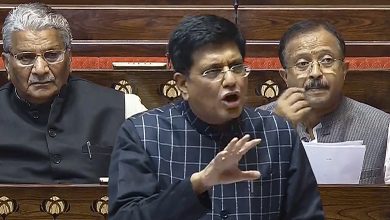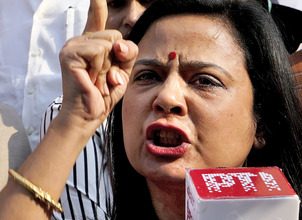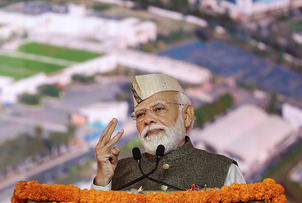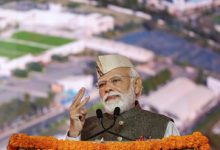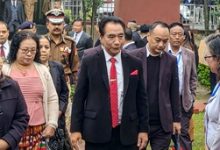Trust Surplus vs Trust Deficit: The Tale of India’s Governance
- Yash Pal Ralhan

In his acceptance speech for the Lokmanya Tilak Puraskar at Pune, Prime Minister Narendra Modi highlighted two contrasting phenomena prevailing in India – “trust surplus” and “people’s hard work,” while pointing out that the previous government was plagued by “policy paralysis.” The term “trust surplus” alludes to a shift in the public sentiment, indicating a growing sense of trust and confidence in the government’s policies and programs.
However, to truly evaluate this claim, we must delve deeper into the actions and challenges that have both contributed to a “trust deficit” and bolstered the notion of “trust surplus” in India’s governance landscape. Trust Deficit in Government Actions One of the significant actions that created a trust deficit was the NDA government’s attempt to introduce the land acquisition ordinance on two occasions. The ordinance’s withdrawal stemmed from the government’s inability to address the concerns of opposition benches and clarify the position of tenant landholders.
The lack of clarity on how the ordinance would affect those farmers who were renting out their land raised questions about the government’s intentions and resulted in a loss of trust among the common people. Even the President of India had to advise the government on the matter, underscoring the importance of addressing opposition concerns before enacting policies. Another contentious action was the government’s decision to demonetize Rs 2000 currency notes.
The implementation of demonetization was flawed and prolonged, causing significant disruption to the economy and daily lives of citizens. The fact that the government had to continue the process for an extended period hinted at the imprudence of the previous demonetization attempt. Such actions not only weaken trust but also raise doubts about the government’s ability to make well-informed decisions that do not harm the interests of the citizens. Education and Employment Challenges The education system also faces challenges that contribute to the trust deficit.
Despite a growing number of students pursuing higher education, many end up seeking employment abroad or in unrelated fields due to a lack of suitable job opportunities in their chosen fields. This mismatch between education and employment leads to a waste of youth potential and calls for comprehensive policies to align education with the job market. Brain Drain and Communal Unrest Furthermore, India is witnessing a concerning trend of high-worth individuals leaving the country, driven by fear of investigative agencies like the Enforcement Directorate (ED), Central Bureau of Investigation (CBI), and income tax department.
This brain drain erodes trust among citizens, as it raises questions about the government’s ability to create a stable and secure environment that encourages talented individuals to stay and contribute to the country’s progress. Adding to the trust deficit is the occurrence of communal riots and unrest in certain regions. Recent events in Haryana and Manipur highlight the government’s challenges in maintaining peace and social harmony, further impacting the trust placed in its ability to ensure law and order. India’s ranking in human rights violations and freedom of the press also contributes to the trust deficit. A low ranking in these areas raises concerns about the government’s commitment to protecting the rights and freedoms of its citizens, which can lead to a deterioration of trust in the government’s actions.
Trust Surplus: A Glimpse of Positive Governance On the other side of the spectrum, the concept of “trust surplus” can be seen in the government’s focus on dynamic policy-making and effective program implementation. Under Prime Minister Modi’s leadership, there has been a clear emphasis on conceptualizing and executing projects in a planned manner. This approach has led to increased implementation rates across various projects and has instilled a sense of trust among the people that the government can deliver on its promises.
Moreover, the Prime Minister’s call for public participation in governmental schemes and programs has further fueled the trust surplus. When citizens feel actively engaged and committed to contributing to the nation’s progress, it demonstrates a mature democratic polity, where the government and the people work together for the greater good.
In light of the previous “policy paralysis” during the regime of Prime Minister Dr. Manmohan Singh, the term “trust surplus” shines brightly, symbolizing the significant shift in public sentiment towards the current government’s approach to governance. The people have noticed a determined and proactive stance towards policy-making and program implementation, and this has resulted in a “trust surplus.” India’s Basking in Good Governance India is experiencing a unique era of successful internal governance, where people express complete faith in the government’s ability to deliver on its promises.
The achievements of this government are not merely the outcome of political rhetoric but rather the result of a vastly apolitical governance approach. The separation of political actions from welfare programs has been recognized and appreciated by the common people, further strengthening the trust surplus. Conclusion India’s governance landscape is characterized by both trust surplus and trust deficit.
While certain actions and challenges have eroded trust among the citizens, the government’s dynamic policy-making and emphasis on public participation have generated a sense of trust and confidence. To strengthen the trust surplus and overcome the trust deficit, the government must address the challenges it faces, foster transparency and accountability, and continue to engage with the people to create a brighter and more prosperous future for India. Only through inclusive and effective governance can the nation truly achieve a state of “trust surplus” across all parameters and realize its full potential on the global stage.



